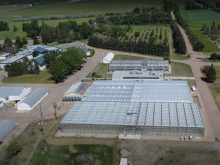The Montana game farm industry could start dying within the next week.
On Nov. 7, Montana voters will decide whether to ban hunt farms and prevent new game farms from starting.
Initiative 143 is part of the ballot all the state’s voters will be given when they go to the polls Nov. 7.
The initiative will become law if it wins a simple majority of votes. If it is passed, the legislature must make it law immediately.
Montanans have been split on the issue of allowing elk and deer to be raised on farms.
Read Also

Heat waves combine sunshine and sinking air
As we continue our look at heat waves, I figured we should first define what they are by looking at the criteria Environment Canada uses to define heat events.
Some farmers see game farms as a good way to diversify their operations and a better money-maker than traditional livestock or grain production.
But many hunters, naturalists and wildlife preservationists oppose the industry, seeing it as an open door to disease, genetic pollution and spiritual loss in what they consider to be wild animals.
The Montana legislature has developed regulations for game farms and for the state’s 17 hunt farms, but they weren’t strong enough to eliminate opponents’ concerns.
“We’ve been frustrated with our legislature,” said Craig Sharpe of the Montana Wildlife Federation, a hunters’ group that supports Initiative 143.
Though they complained for years about game farms and hunt farms, the issue only became a public concern after chronic wasting disease was discovered on a Montana game farm.
It crystallized opposition, Sharpe said, because it proved the game farm industry was bringing diseases into the state and endangering local animals.
“It’s a threat to the public, free-ranging wildlife in Montana.”
Hunters are also appalled at the idea of shooting animals in enclosures, he said.
“We don’t believe it’s ethical hunting.”
But deer, elk and cattle producers are opposing the initiative. Deer and elk producers are fighting to save their industry. Not only could new operations be banned under the initiative, but existing game farms could not be sold to anyone else.
Cattle producers are opposing the initiative too, said Beth Emter of the Montana Stockgrowers Association, because they see it as an attack on agriculture.
“The fear is that this will be a slippery slope.”
Cattle producers don’t believe there is any danger of disease or genetic pollution from captive deer and elk.
“We feel that they’re playing on people’s emotions,” said Emter.
To get an initiative onto the ballot, five percent of the voters in a majority of voting districts of the state had to sign a petition. That required 19,864 signatures. Organizers gathered more than 28,000.
Sharpe said public opinion polls have shown that Montanans have been evenly split through most of last year on the issue. However, the most recent poll shows the anti-game farm side edging ahead, with 56 percent of popular support.















